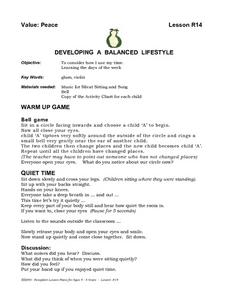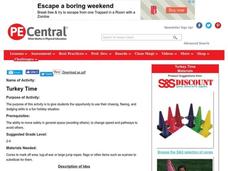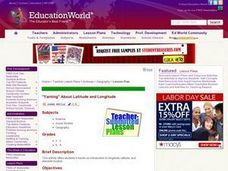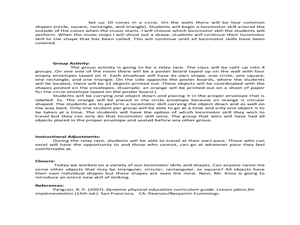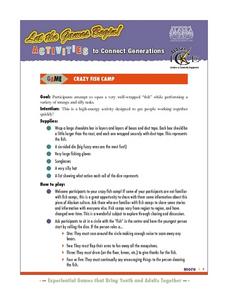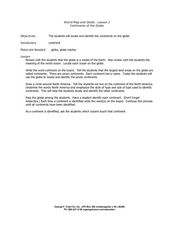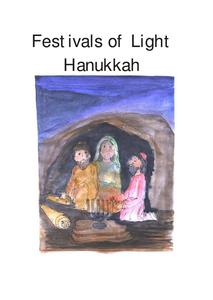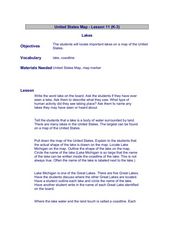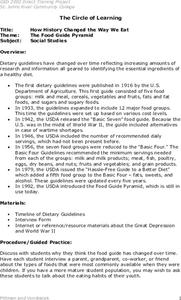Perkins School for the Blind
Circle Time
Oftentimes children or teens with one or more disability are reluctant to participate in whole-group activities. Foster good participation, verbal expression, and social skills through daily circle time activities. Each day you and...
Curated OER
Inner Circle/Outer Circle Debate Strategy
Arranged in facing concentric circles, half the class discusses an issue. The other half of the class takes notes which are then used to fuel a class discussion and to prepare editorial opinions on the topic at hand. So much emphasis is...
Curated OER
Developing A Balanced Lifestyle
Students engage in a study of the character trait of peace and how it is useful to becoming part of a lifestyle. The lesson plan asks students to read a story that illustrates the concept that is followed by targeted questions to be...
Curated OER
Greek Story Vases
There are so many ways to tell a story! Develop visual storytelling skills while facilitating an understanding of Greek art and culture. Learners design Greek style images to tell a story through art. They add their designs to Styrofoam...
Curated OER
Turkey Time
Students move safely in a general direction while practicing their chasing, fleeing, and dodging skills. They practice using a Thanksgiving theme for the activity.
Curated OER
"Yarning" About Latitude and Longitude
Learners identify various locations using latitude and longitude. In this map skills lesson, students use yarn and labels to create a "human globe." Learners identify the Prime Meridian, the Equator, and Northern and Southern Hemisphere.
Curated OER
Shapes and Review of Locomotor Skills
Pupils engage in a series of loco-motor activities based on shapes. In this loco-motor lesson, students demonstrate physical skills through races, jumping, hopping, galloping in circles, squares, rectangles and triangles.
Curated OER
Chinese New Year
Gong hei fat choy! Celebrate Chinese New Year with a variety of activities that introduce learners to the Chinese myth of the race that determined which animals earned their place the zodiac.
Curated OER
Crazy Fish Camp
Students participate in a lesson that reviews the importance of fishing for people who live as natives in Alaska. The game is played in order to unwrap an object that represents the fish in a short amount of time. The object is to open...
Lisa Staab Shadburn
Play Therapy Activities to Enhance Self‐Esteem
Discover activities to help learners increase self-awareness, build peer and family relations, and develop positive self-esteem. Here you'll find six suggestions for instilling a sense of confidence and self awareness in youngsters. Each...
Curated OER
Parachute
Students participate in an instant activity as they enter the gym. They work with a parachute, moving it using different motions. They use their wrists, to move the parachute while moving in a circle, and play a game of Cat and Mouse...
Curated OER
Continents of the Globe
Students identify the continents on the globe. In this map skills lesson, students define the term "continent" and identify the seven continents on the globe.
Council for the Curriculum, Examinations and Assessment
Festivals of Light Hanukkah
Five sessions make up a lesson on the Jewish celebration of Hanukkah. After reading and teaching young historians the history of the Jewish holiday, learners explore the celebration through hands-on activities and collaborative...
Curated OER
Physical Education - Gallop
Learners practice galloping. In this gross motor skills lesson, students review how to jump and hop using a jump-rope and hopscotch. The teacher shows the steps to gallop and they hold a noodle and pretend as if they are riding a...
Curated OER
Comparing the Ancient and Modern Olympics: A Venn Diagram
Students compare and contrast today's Olympic Games to those held in ancient Greece. They read newspapers, conduct Internet research, watch TV coverage of current Olympic Games and organize their findings on a Venn diagram.
Curated OER
No Name-Calling Week
Students discuss if they have ever heard someone being bullied or called a name; if so, as each child shares, they hold hands and form a linked circle. They then talk about what they can say or do when they witness name-calling or bullying.
Curated OER
Amelia Earhart Putnam
Students travel the world with Amelia Earhart, mapping out their own route and then comparing it to the one she flew as she attempted to circle the earth in an airplane. They apply military time as it pertained to Earhart's disappearance.
Curated OER
Rules and Consequences in the Classroom
Students study rules and consequences as well as learn positive, healthy behaviors in and out of the classroom. In this behavior lesson, students discuss behaviors that got them into trouble at home. Students name trouble behaviors at...
Curated OER
United States Map - Lesson 11
Students explore lakes of the United States. In this geography activity, students identify noteworthy lakes on a map of the United States.
Curated OER
The Changing Landscape
Young scholars explore how the landscape is constantly changing. In this landscape activity, students identify a building under construction on the Landscape Picture Map. Young scholars discuss the purpose of the construction and the...
Curated OER
Columbus' Voyage to the New World
Students develop cooperation skills and to teach rules and how to follow them. Students create voyage card. They discuss and decide on some situations that may have or did occur to the crew during Columbus voyage to the new world. ...
Curated OER
How Did Civil War Soldiers Battle Boredom?
Students create a Venn diagram to show how they and combat soldiers during the Civil War dealt with boredom. They discover what the soldiers did to help time pass. They use the Internet to gather information.
Curated OER
How History Changed the Way We Eat
Students participate in a lesson that is concerned with the history of the food pyramid and how it evolved and changed into its modern state. After being presented with the information they conduct classroom discussions about the research.
Curated OER
Calling the Names
Students stand in a large circle and think of individuals who support, inspire, or guide them. They reflect on the exercise, either in discussion or writing.


